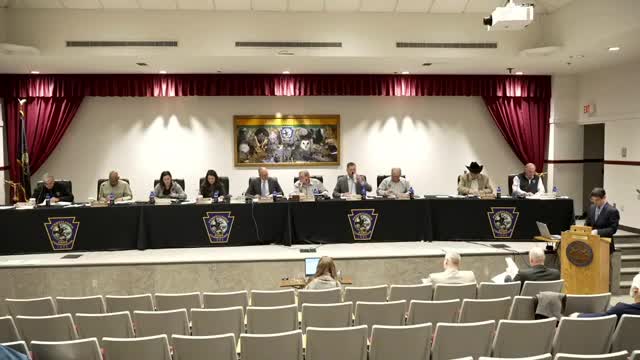Commission expands DMAP/Agtag options, adds WMU-level changes and asks staff to review allocations
Get AI-powered insights, summaries, and transcripts
Subscribe
Summary
The Pennsylvania Game Commission adopted targeted changes to deer-management programs, approving DMAP-specific extended seasons, adding WMU 4C for a CWD response, and increasing personal antlerless quotas in WMUs 5C and 5D.
The Pennsylvania Game Commission on April 12 adopted a series of changes intended to give landowners and managers more tools to reduce deer-related crop and forest damage and to respond to chronic wasting disease (CWD) detections.
Commissioners approved a floor amendment to add an extended regular-firearms antlerless season limited to DMAP (Deer Management Assistance Program) properties. The extension applies only to DMAP properties and requires the hunter to be in possession of a DMAP harvest coupon while hunting that property. Commissioners said the amendment is intended to give landowners targeted, parcel-level management tools without drawing from regular WMU allocations.
The board also approved an amendment to add Wildlife Management Unit (WMU) 4C to an extended regular firearm season (specific to a CWD response) after commissioners raised CWD concerns in that region; staff noted two detections in the broader area and said an expanded season would aid monitoring and harvest objectives.
Other actions adopted during the meeting included: - Increasing the personal quota of antlerless deer licenses for individuals purchasing antlerless licenses in WMUs 5C and 5D from six licenses to 15 licenses. - Removing the two-year public-access enrollment requirement for all agricultural deer control (AG tag/DMAP) applicants and simplifying documentation by replacing deed/lease production with applicant certification of ownership/lessee status and hunting rights for the land. - Proposals to consolidate and simplify crop-damage programs (DMAP, AG tag, related programs) and to consider technology improvements such as QR codes on tags were discussed; staff were encouraged to study feasibility.
Biologists and staff framed the changes as programmatic adjustments while urging evaluation. "We're proposing, this upcoming year to evaluate the deer program as a whole," said Dr. Matthew Schnoop of the Bureau of Wildlife Management, noting that allocations have risen from roughly 1,000,000 to more than 1,300,000 and that the program is a "slow-moving" system that needs assessment. Schnoop told commissioners the bureau will review what works in DMAP and how allocation increases interact with program use.
Commissioner Kristen Coppenhaver, who sponsored the DMAP extension amendment, said the change is narrowly targeted to DMAP properties and is meant to provide relief to landowners — including foresters — who report heavy browse pressure. "This is a tool for them to use on a much smaller level than the WMU level," she said, and invited staff to bring DMAP stakeholders into the evaluation process.
Several commissioners urged caution, asking staff to analyze how pending changes such as new Sunday-hunting legislation or the Agtag revisions could alter harvest patterns before making broad statewide changes. Commissioner Fredericks emphasized the role of the wildlife management committee and the need to rely on scientific recommendations from agency biologists.
Why it matters: The combined changes give landowners and managers more targeted harvest opportunities to address localized crop and timber damage and to respond to CWD detections. At the same time, the Commission directed staff to evaluate the cumulative effect of allocation increases, emerging program changes (Agtag, Sunday hunting), and DMAP usage before proposing further statewide policy changes.
Next steps: Staff in the Bureau of Wildlife Management will evaluate DMAP effectiveness, allocation impacts and the interaction with Agtag and any new Sunday-hunting authority. Commissioners asked for stakeholder engagement and follow-up reporting.
